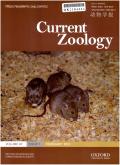纸黄蜂的行为综合征:Polistes fuscatus的社会性和非社会性人格之间的联系
IF 2
2区 生物学
Q2 ZOOLOGY
引用次数: 0
摘要
尽管许多研究都集中在活动、探索和恐新症等非社会性人格特质上,但人们越来越认识到,社会性人格特质在群体动态、疾病传播和适应性方面发挥着重要作用,而且社会性人格特质可能与非社会性人格特质有关。这些关系之所以重要,是因为行为综合征(在此被定义为相关的行为表型)可以制约进化反应。然而,社会性和非社会性人格特质之间关系的强度和方向仍不清楚。在本项目中,我们研究了纸蜂 Polistes fuscatus 的社会性和非社会性人格特征,以及它们之间的关系。通过一种新颖的检测方法,我们确定了五种人格特质,其中两种是非社会性人格特质(探索和活动),三种是社会性人格特质(攻击、归属和触角)。我们还发现,社会性和非社会性人格特质在表型上存在联系。我们发现攻击性和活动性之间呈正相关,而从属性和活动性之间呈负相关。我们还发现探索与活动之间存在正相关。我们的工作是了解社会行为和非社会行为之间的表型联系如何影响行为进化的重要一步。作为研究社会行为遗传和神经生物学机制的一个新兴模型系统,波罗的海蝇有可能通过探索个体行为变异的原因和后果为这项工作添砖加瓦。本文章由计算机程序翻译,如有差异,请以英文原文为准。
Behavioral syndromes in paper wasps: Links between social and non-social personality in Polistes fuscatus
Although much work has focused on non-social personality traits such as activity, exploration, and neophobia, there is a growing appreciation that social personality traits play an important role in group dynamics, disease transmission, and fitness, and that social personality traits may be linked to non-social personality traits. These relationships are important because behavioral syndromes, defined here as correlated behavioral phenotypes, can constrain evolutionary responses. However, the strength and direction of relationships between social and non-social personality traits remain unclear. In this project, we examine social and non-social personality traits, and the relationships between them, in the paper wasp Polistes fuscatus. With a novel assay we identify five personality traits, two non-social (exploration and activity) and three social (aggression, affiliation, and antennation) personality traits. We also find that social and non-social personality traits are phenotypically linked. We find a positive correlation between aggression and activity and a negative correlation between affiliation and activity. We also find a positive correlation between exploration and activity. Our work is an important step in understanding how phenotypic linkage between social and non-social behaviors may influence behavioral evolution. As a burgeoning model system for the study of genetic and neurobiological mechanisms of social behavior, Polistes fuscatus has potential to add to this work through exploring the causes and consequences of individual behavioral variation.
求助全文
通过发布文献求助,成功后即可免费获取论文全文。
去求助
来源期刊

Current Zoology
Agricultural and Biological Sciences-Animal Science and Zoology
CiteScore
3.20
自引率
9.10%
发文量
111
审稿时长
6 weeks
期刊介绍:
About the Journal
Current Zoology (formerly Acta Zoologica Sinica, founded in 1935) is an open access, bimonthly, peer-reviewed international journal of zoology. It publishes review articles and research papers in the fields of ecology, evolution and behaviour.
Current Zoology is sponsored by Institute of Zoology, Chinese Academy of Sciences, along with the China Zoological Society.
 求助内容:
求助内容: 应助结果提醒方式:
应助结果提醒方式:


